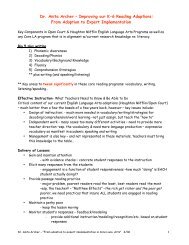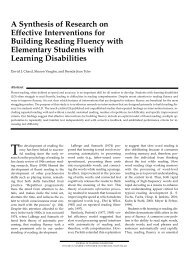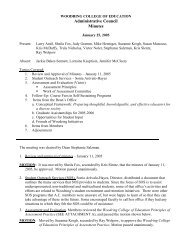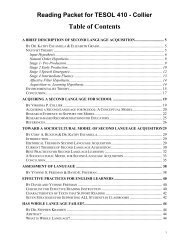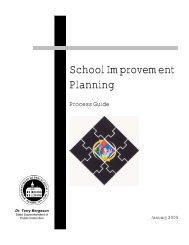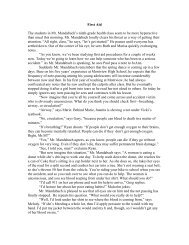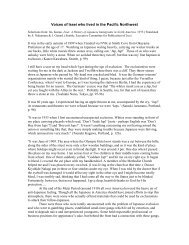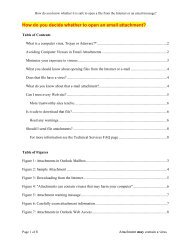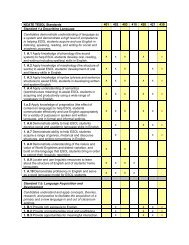encouragement as <strong>the</strong>y are attempting to make sense <strong>of</strong> <strong>the</strong>ir world while learning tocommunicate in <strong>the</strong> second language.Player 3: The FamiliesLinguistically and culturally diverse families also struggle with issues <strong>of</strong> language shift and lack<strong>of</strong> respect for home languages and cultures (Soto, 1997). One poignant example involves aLatino family who, like many o<strong>the</strong>r families, received <strong>the</strong> following advice from a wellintentionedKindergarten teacher:La missy nos dijo (<strong>the</strong> teacher told us) that we should speak English-only at home. She warnedus that if Graciella could not speak English (fluently) by <strong>the</strong> end <strong>of</strong> <strong>the</strong> year, she would be heldback. We told Abuelita (Grandmo<strong>the</strong>r) not to talk to Graciella because she would only confuseher. But Graciella spends so much time with Abuelita that we wonder if that is such a good idea.What do you suggest we do?Giving advice to speak English-only at home can have tragic outcomes for culturally andlinguistically diverse families (Wong Fillmore, 1991). Home languages and home cultures are at<strong>the</strong> heart <strong>of</strong> <strong>the</strong> communicative process for families; thus, teachers who provide advice that iscongruent with research evidence, mainly that a strong home language base actually facilit<strong>ates</strong>children's second language learning, are in many ways providing a gift to <strong>the</strong>ir students.Player 4: The CommunitiesThe Wall Street Journal ar<strong>ticle</strong> (April 10, 1996), referred to earlier, documents <strong>the</strong> intentions <strong>of</strong> agroup <strong>of</strong> English-only proponents ("bilingual education abolitionists") in a Pennsylvania schooldistrict. Hoping to dismantle <strong>the</strong> district's bilingual education program, <strong>the</strong> group initiated aseries <strong>of</strong> public meetings to discuss <strong>the</strong> issue. Debate over <strong>the</strong> educational goals <strong>of</strong> <strong>the</strong>community became increasingly divisive, with <strong>the</strong> school board calling for police protection tomaintain order. This was unwarranted, as <strong>the</strong> bilingual families who were participating in <strong>the</strong>meeting were not acting aggressively, but had simply knelt and prayed to demonstrate <strong>the</strong>irbelief in <strong>the</strong> value <strong>of</strong> <strong>the</strong> bilingual program for <strong>the</strong>ir children.Preserving Home Languages and Cultures in <strong>the</strong> ClassroomWhat is interesting for educators to note about such bitter community battles over multiculturaleducation is that <strong>the</strong>y contrast sharply with what happens in most nations <strong>of</strong> <strong>the</strong> world. Schoolsin Denmark, Sweden, France, Greece, Germany, Hungary, Scotland, Canada, Australia, Africa,and England, have long included second language learning opportunities for even <strong>the</strong>ir youngestchildren. Teachers are also expected to have second language skills; in Luxembourg, forexample, <strong>the</strong> typical teacher is competent in French, German, English, and Letzeburgesch (Peck,1993).The opportunity for communities to be knowledgeable about languages and cultures was outlineda decade ago by <strong>the</strong> President's Commission on Foreign Language and <strong>In</strong>ternational Studies(1980):The <strong>Un</strong><strong>ited</strong> <strong>Sta</strong>tes is blessed with a largely untapped resource <strong>of</strong> talent in <strong>the</strong> form <strong>of</strong> racial andethnic minorities who, by being brought into <strong>the</strong> mainstream <strong>of</strong> educational and employmentopportunities ... can be expected to make rapid, new, and valuable contributions to America'scapacity to deal persuasively and effectively with <strong>the</strong> world outside its borders (p. 24).© 2008 Dr. Ca<strong>the</strong>rine CollierAll Rights Reserved126
Daily Realities RecappedThe above vignettes illustrate <strong>the</strong> challenge <strong>of</strong> acknowledging and responding to children's homelanguages and cultures in <strong>the</strong> midst <strong>of</strong> so much controversy and at <strong>the</strong> multiple levels <strong>of</strong>children's learning environments. Out <strong>of</strong> this challenge, however, arises <strong>the</strong> opportunity foreducators to provide <strong>the</strong>ir students with <strong>the</strong> gift <strong>of</strong> <strong>the</strong>ir home language and culture, and to help<strong>the</strong>m reap <strong>the</strong> academic and socio-affective benefits <strong>of</strong> such an approach.The Opportunities: Practical ImplicationsWhat are <strong>the</strong> practical implications for teachers working with diverse learners? Althoughselecting effective methods for addressing diversity is complex, and existing research sometimescontradictory, <strong>the</strong>re are strategies that will enable children to value and appreciate <strong>the</strong>ir family'sidentity, to feel secure about using <strong>the</strong>ir home language, and to respect <strong>the</strong> cultural diversity <strong>of</strong><strong>the</strong>ir classm<strong>ates</strong>. Below is a list <strong>of</strong> practical applications for teachers that recognize and honorchildren's multifaceted linguistic and cultural abilities:Preserving Home Languages and Cultures in <strong>the</strong> ClassroomAccept <strong>the</strong> premise that children are members <strong>of</strong> diverse family and community systemsbringing multiple gifts <strong>of</strong> language, culture, and wisdom (Soto, et al., 1995; Soto, 1996)* Work toward <strong>the</strong> preservation <strong>of</strong> home languages and cultures in order to enhance familycommunication and children's identities (Chang, 1993)* Learn and share knowledge about <strong>the</strong> wisdom gained from culturally diverse families,including consensus building* Maximize cultural courtesies that demonstrate respect for <strong>the</strong> community, <strong>the</strong> family, and<strong>the</strong> child* Create bonds among caregivers and families that build relationships and model extendedfamily valuesBecome an ethnographer; keenly observe children's language capabilities, both in <strong>the</strong> nativelanguage and <strong>the</strong> second language (Genishi, 1989)* Observe and record au<strong>the</strong>ntic language use (Soto, 1991)* Create a portfolio documenting language growth and progression in both formal andinformal contexts (Salinger, 1996)Encourage and accept children's attempts to communicate since errors are a normal part <strong>of</strong>language learning (Bredekamp & Coppolo, 1997)* Adopt a learner-centered teaching style: responsive and nurturing (Smrekar, 1994)* Disseminate information to families that helps <strong>the</strong>m to understand <strong>the</strong> role homelanguage plays in child development and family cohesion* Afford opportunities for teachers, children and families to share linguistic and culturalknowledgeProvide many opportunities for children to communicate (Smrekar, 1994)* Arrange <strong>the</strong> classroom with spaces that encourage social interaction* Schedule ample pretend, free play, and dramatic experiences in order to facilitate peersocial interaction* Foster optimal language learning with good language role models in both <strong>the</strong> home and<strong>the</strong> second language (Wong Fillmore, 1992)Plan au<strong>the</strong>ntic integrated activities that allow children to value and appreciate <strong>the</strong>ir identities(Gutwirth, 1997; York, 1991)© 2008 Dr. Ca<strong>the</strong>rine CollierAll Rights Reserved127
- Page 2 and 3:
"Those who arrive by age 12 or 13 m
- Page 5:
Article I.2 Are Signed Languages "R
- Page 8 and 9:
Biological analyses of the status o
- Page 10 and 11:
and beyond, speaking and signing ch
- Page 12 and 13:
Conclusion: Are Signed Languages Re
- Page 14 and 15:
Article I.3 The Interpreter: Has a
- Page 16 and 17:
A few weeks earlier, I had called F
- Page 18 and 19:
“We struggled even getting to the
- Page 20 and 21:
herself by strapping a cassette rec
- Page 22 and 23:
In 1998, after nine years as the ch
- Page 24 and 25:
momentary burst of excitement that
- Page 26 and 27:
can shape core grammar. Because the
- Page 28 and 29:
The authors compared animal and hum
- Page 30 and 31:
monkey moved. He followed it with h
- Page 32 and 33:
delight, fear, laughter, and surpri
- Page 34 and 35:
Piipaío in a hut: Pirahã huts typ
- Page 36 and 37:
LEP students, and equitable organiz
- Page 38 and 39:
4. Second language development crea
- Page 41 and 42:
curriculum or "teaching to the test
- Page 43 and 44:
portfolio work was scanned and stor
- Page 45 and 46:
experiences of many groups of stude
- Page 47 and 48:
While not disagreeing that interpre
- Page 49 and 50:
sound educational practice, however
- Page 51 and 52:
arises from the efforts to abstract
- Page 53 and 54:
Article II.2 Cross-Cultural Communi
- Page 55 and 56:
males who can serve as positive rol
- Page 57 and 58:
Understanding another culture is a
- Page 59 and 60:
Pets and AnimalsWhich animals are v
- Page 61 and 62:
to teach standard English is reflec
- Page 63 and 64:
Asking personal questions of a pers
- Page 65 and 66:
Using Cross Cultural Communication
- Page 67 and 68:
Why Do Nonstandard English-Speaking
- Page 69 and 70:
Before beginning to teach standard
- Page 71 and 72:
• Negative attitudes toward low p
- Page 73 and 74:
New standardized tests and assessme
- Page 75 and 76: Each of the behaviors listed above
- Page 77 and 78: Article II.3 Hard Work Hypothesis:
- Page 79 and 80: each point higher in SES, students
- Page 81 and 82: This case does not provide strong s
- Page 83 and 84: Article II.4 Language Acquisition a
- Page 85 and 86: 1992, p. XI). These researchers, wh
- Page 87 and 88: comprehend a word within a specific
- Page 89 and 90: more to the truthfulness of the chi
- Page 91 and 92: This idea of “semilingualism” c
- Page 93 and 94: Article III.1 A Brief Description o
- Page 95 and 96: take different lengths of time to c
- Page 97 and 98: example, should involve the same co
- Page 99 and 100: As with all stages of BICS acquisit
- Page 101 and 102: Assessment techniques at stage 3 ca
- Page 103 and 104: different. Therefore, the social di
- Page 105: integrative motivation. Basically,
- Page 109 and 110: (Ellis, 1985; Hakuta, 1986). Howeve
- Page 111 and 112: that sociocultural processes have o
- Page 113 and 114: Article III.3 How Children Acquire
- Page 115 and 116: phonetic units (unique to signed la
- Page 117 and 118: Article III.4 Toward a Sociocultura
- Page 119 and 120: emember is that the fundamental goa
- Page 121 and 122: The best practices models can be th
- Page 123 and 124: By focusing on the dialectic betwee
- Page 125: intergenerational wisdom shared by
- Page 129 and 130: traditions. At a time in our histor
- Page 131 and 132: We will now look at two examples of
- Page 133 and 134: Speakers communicate fluently, main
- Page 135 and 136: question the effects of such attitu
- Page 137 and 138: Article IV.3 Culture Change: Effect
- Page 139 and 140: and psychological characteristics o
- Page 141 and 142: Contraryto what wewere expecting, t
- Page 143 and 144: Article V.1 Assessment in ESL & Bil
- Page 145 and 146: vocabulary does the student lack?Is
- Page 147 and 148: whether they are LEP and to provide
- Page 149 and 150: Fourth, ESL and bilingual program s
- Page 151 and 152: competent reader/writer. All versio
- Page 153 and 154: Table 1Comparison of Recent Accultu
- Page 155 and 156: unilinear model, which measures the
- Page 157 and 158: an English-only instructional progr
- Page 159 and 160: Article V.3 Assessment of English L
- Page 161 and 162: 8. Change answers only for a very g
- Page 163 and 164: Riles, 1979; Jose P. v Ambac, 1983)
- Page 165 and 166: proficiency is often underestimated
- Page 167 and 168: Finally, when second language reade
- Page 169 and 170: for their decisions, noting issues
- Page 171 and 172: As mentioned above, when the transi
- Page 173 and 174: ather than generic adjectives and t
- Page 175 and 176: their imagined points of view. Ther
- Page 177 and 178:
English texts and demonstrate progr
- Page 179:
using inter-district teams). In the




